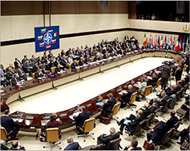Nato members turn down Iraq mission
In an unprecedented departure from Nato practice, several alliance members will not allow their own officers assigned to Nato’s two command centres to participate in its first collective post-war mission in Iraq, a senior US official said.

The Bush administration has hailed Nato’s new plan to train about 1000 Iraqi army officers annually as an important signal of growing trans-Atlantic consensus after bitter alliance divisions in the run-up to the US-led Iraq war.
But the refusal of France, Germany, Spain, Belgium, Greece and Luxembourg to let their officers assigned to Nato’s command centres in Mons, Belgium, and Norfolk, Virginia, be part of that effort underscores that serious differences persist.
“Some of the countries have said they’re not going to allow their officers stationed in those Nato commands who come under the Nato structure itself to serve in Iraq. A number of us have been surprised by that,” said a senior US official.
“I believe it’s the first time that this kind of thing has happened,” he said.
He said it is one thing for Nato countries to decide not to contribute their own national forces to an alliance mission.
“But when you send a colonel to Norfolk for three years from any country, that colonel comes under the command of the (Nato) supreme allied commander in Norfolk. One would think he would be able to deploy those officers as he wanted to,” the official said.
Precedent
The US is concerned about the precedent and “there is a continuing disagreement” within Nato, he said.
 |
|
The 26-member alliance met in |
Still, he stressed, even holdout countries approved the mission by consensus and are committed to sharing costs.
Publicly, the US focused on the positive.
“I think it does not detract from the important signal that achieving consensus on this mission represents and on the kind of cooperation that we’ve seen to actually deal with the logistics and get it under way,” State Department deputy spokesman Adam Ereli told a news briefing.
The 26-member alliance agreed to set up the new training scheme at a summit in Istanbul in June after overcoming French and other countries’ misgivings over whether Nato should have a role in Iraq at all.
Key Nato members France and Germany were adamantly opposed to the 2003 US invasion that ousted Saddam Hussein from power.
Plans’ approval
US officials said Nato’s approval on Wednesday of detailed operational plans for the mission would allow Nato to put roughly 400 allied officers in Baghdad to train senior leaders of the new Iraqi armed forces.
 |
|
Interim President al-Yawir (L) |
Plans also call for 1000 to 1200 support personnel to help protect the trainers and provide logistics and communications.
There are about 65 such personnel in Baghdad right now with the rest due over the next six weeks.
The Nato academy will operate alongside a much larger US-led training mission, which aims to train some 150,000 Iraqi security personnel before elections due in January.
Britain, the United States, Denmark, Norway, Italy, the Baltic nations, Romania and Bulgaria are expected to contribute military training officers, the US official said.
Many countries will also contribute force protection troops – including Hungary, despite the fact that its parliament voted on Monday to end the participation of its forces in the larger multinational force in Iraq.